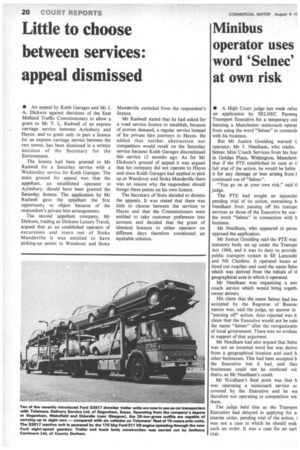Minibus operator uses word 'Selnec' at own risk
Page 22

If you've noticed an error in this article please click here to report it so we can fix it.
• A High Court judge last week refus an application by SELNEC Passeng Transport Executive for a temporary ord banning a Manchester minicoach operat from using the word "Selnec" in connectit with his business.
But Mr Justice Goulding warned tl operator, Mr J. Needham, who trades Selnec Mini Coach Services from his hon in Golden Place, Withington, Manchest. that if the PTE established its case at ti full trial of the action, he would be liable it for any damage or loss arising from 1 continued use of "Selnec".
"You go on at your own risk," said ti judge.
The PTE had sought an injunctio pending trial of its action, restraining Is Needham from passing off his transpo services as those of the Executive by use the word "Selnec" in connection with h business.
Mr Needham, who appeared in perso opposed the application.
Mr Justice Goulding said the PTE was statutory body set up under the Transpo Act 1968, and it was its duty to provide public transport system in SE Lancashil and NE Cheshire. It operated buses ar hired out coaches and used the name Selm which was derived from the initials of ti geographical area in which it operated.
Mr Needham was organizing a mir coach service which would bring togeth• owner drivers.
His claim that the name Selnec had bet accepted by the Registrar of Busine: names was, said the judge, no answer in "passing off' action. Also rejected was h claim that the Executive would not be usin the name "Selnec" after the reorganizatio of local government. There was no evidenc in support of that argument.
Mr Needham had also argued that Seine was not an invented word but was derive from a geographical location and used b other businesses. This had been accepted b the Executive but it had, said thes businesses could not be confused wit theirs, as Mr Needham's could.
Mr Ndedham's final point was that h was operating a minicoach service nc covered by the Executive and he wa therefore not operating in competition wit them.
The judge held that as the Transpor Executive had delayed in applying for al interim order, pending trial of the action, i was not a case in which he should mak such an order. It was a case for an earl: trial.








































































































